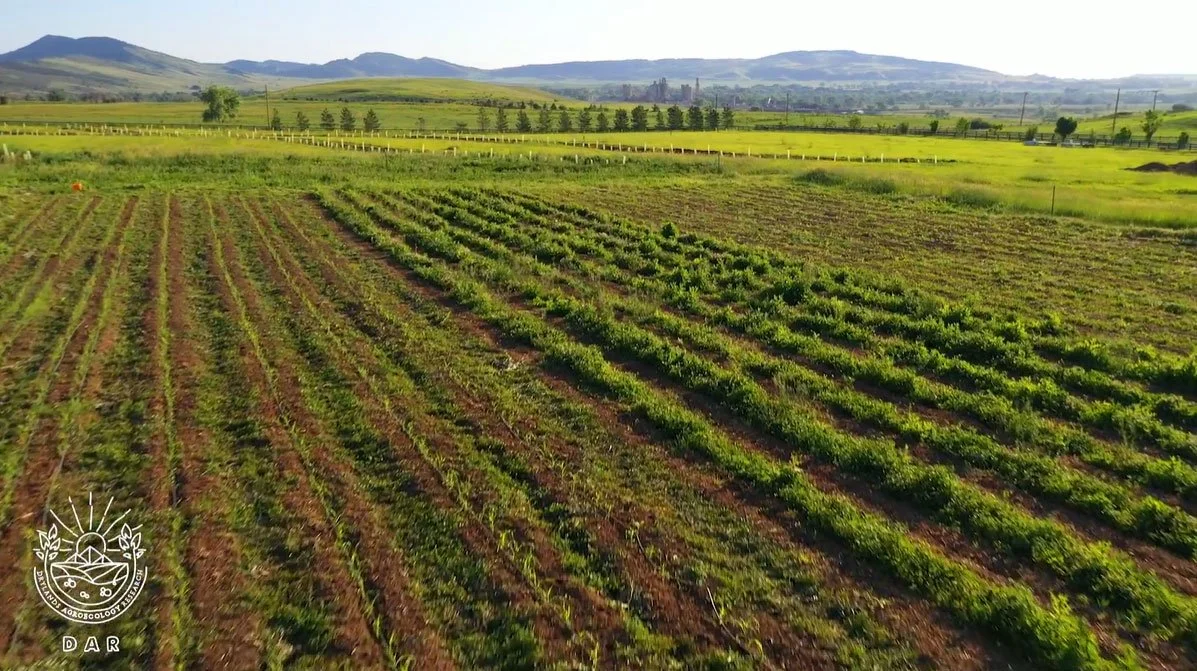
Impact Grant - $75,000 - 2025
Drylands Agroecology Research
Longmont, CO
1-year $75,000 Impact Grant (2025)
Drylands Agroecology Research
Longmont, Colorado
Dryland Silvopasture at Land Partner Sites: A Model for Rehydrating the Arid West Sites
Drylands Agroecology Research is a 501(c)(3) in Longmont, CO. DAR recognizes that in arid and semi-arid climates, water limits the ability of the landscape to sequester carbon, support biodiversity, and produce food. Desertification, the process by which fertile land becomes desert, as a result of drought, deforestation, or inappropriate agriculture, threatens nearly one-fifth of the globe and contributes to climate change. DAR’s vision is to reclaim and transform dry, abandoned, and marginalized landscapes into productive agricultural ecosystems where humans, animals, nature, and spirit can thrive through regenerative design.
DAR uses the principles of ecology to design resilient farm systems that rehydrate landscapes, sequester carbon, support biodiversity, and produce nutritious food for humans.
In 2015, despite NRCS declaring the parcel not farmable, and inspired by indigenous land practice and permaculture methods, Nick DiDomenico, Executive Director of DAR, began farming a barren, desertified 14-acre parcel now known as Elk Run Farm, the pilot project for Drylands Agroecology Research. Today, through land partnerships, the organization is working to scale the success of Elk Run to 1000 acres throughout Boulder County to create a model for transforming degraded lands into economically, agriculturally, and ecologically abundant micro ecosystems. Central to their model are three practices: (1) Agroforestry and Water Management through Terraforming Contour Swales to rehydrate the land, (2) Intensive Livestock Management and Holistic Grazing, and (3) Perennial and Bioregional Crop Breeding and Development.
Swales at Yellow Barn Farm
DAR’s Silvopasture project will expand and build on the work performed on the Yellow Barn project, which was awarded an Impact Grant in 2022. The 2025 funds will be used to work with three additional partner sites to develop:
Contour Terracing: Terraces will be established with a bulldozer to optimize water retention and distribution across the landscape.
Soil Amendments: Terraces will be enriched with mineral rock amendments, micronutrients, a 2-inch layer of compost, and a 3-inch layer of wood chips to boost fertility and soil structure.
Tree and Shrub Planting: A diverse combination of native species will be planted, including nitrogen-fixing trees and shrubs, fruiting trees, and fruiting shrubs. These species will provide livestock feed, support biodiversity, and create habitat for wildlife.
Seeding Berms: Berms will be reseeded with a drylands pasture mix to create resilient ground cover that supports grazing and ecosystem functionality.
Nutrient Cycling: Holistic grazing management to prevent overgrazing and promote restorative land use. The nutrients dropped will support microbial health and increase water-holding capacity in the soil.
These land partners are within 20 miles of DAR headquarters and are intended to become grazing and research partners. Projects are designed to be replicable and scalable land stewardship and financial models.
More about DAR: watch this documentary short
DAR's vision is to transform dry, abandoned, and marginalized landscapes into lush ecosystems where humans, animals and spirit can thrive.
Drylands Agroecology Research was created in order to assist other land stewards in building regenerative systems, while bolstering their own research and demonstration of these systems in multiple locations. From clarifying goals to site assessment and implementation, DAR supports the regenerative process taking shape.
DAR advocates goals that align with ecological resilience, and design systems that meet the inherent goals of their steward partners. Throughout this process, they document progress, collect data, and share their findings.
More information: https://dar.eco
“These young Colorado farmers are changing the future of agriculture.”



